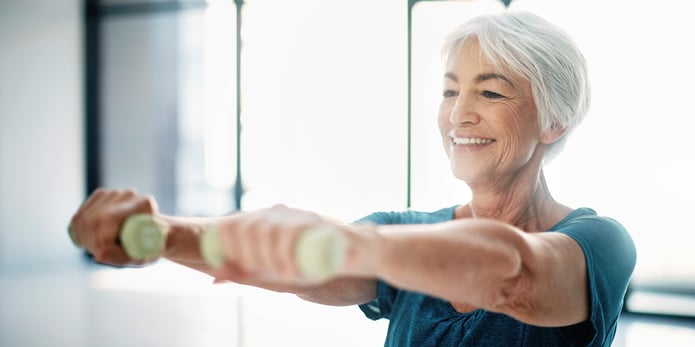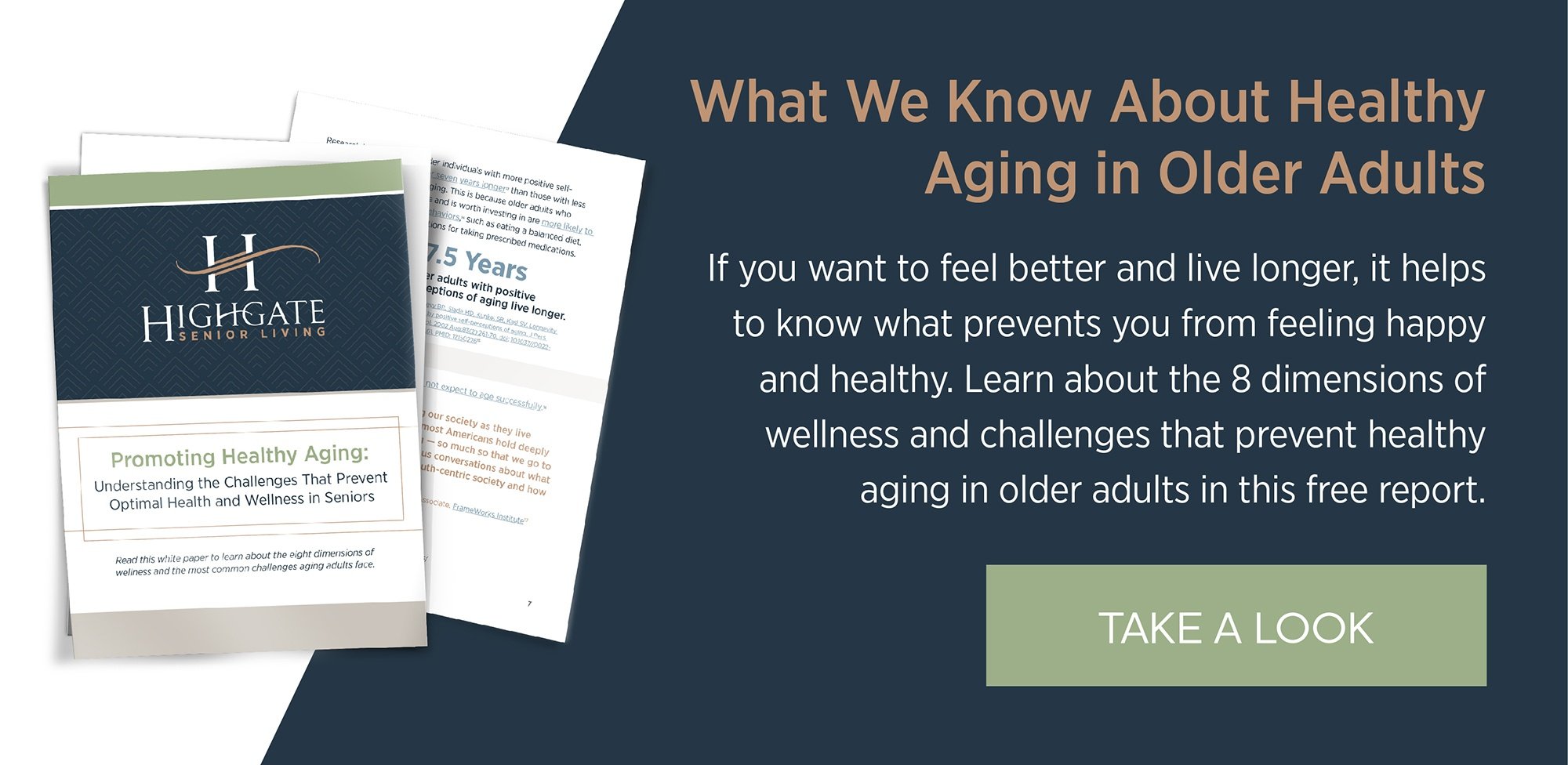
Yes, improving your diet, staying active, and regularly going to the doctor can help you age well. But aging and wellness experts have some additional insight that might surprise you.
Did you know that merely expecting your body to decline with age actually increases the likelihood that it will? Or that you are more likely to live to an older age than those that feel like life has little purpose? Here are eight wellness statistics about healthy aging that may surprise.
Add Years to Your Life with Positive Thinking
Everyone stereotypes. Psychologists say we need these mental shortcuts to help our brains navigate the world. But when it comes to aging, negative stereotypes about getting older can become a self-fulfilling prophecy — if you think aging means declining health and eventual disability, your health will likely suffer.
In a study conducted at Yale University, researchers asked 660 participants aged 50 and older to respond to agree or disagree with statements as, “Things keep getting worse as I get older,” “I have as much pep as I did last year,” and “As you get older, you are less useful.” They found that older adults with positive self-perceptions of aging — those who see aging in terms of opportunity and growth — lived on average 7.5 years longer than those with less positive self-perceptions of aging.
"Our study carries two messages,” the authors write in their paper, published in the Journal of Personality and Social Psychology. “The discouraging one is that negative self-perceptions can diminish life expectancy; the encouraging one is that positive self-perceptions can prolong life expectancy.”
Reduce the Risk of Alzheimer’s Disease
If you’re worried about getting Alzheimer’s — and 70% of people 70 and older are — it’s time to take the “use it or lose it” mentality to heart.
Research out of Rush University Medical Center shows that older adults who frequently participate in common cognitive activities (including reading the newspaper, going to museums, and playing puzzle games) have a 47% less chance of developing Alzheimer’s disease than people who don’t challenge their minds in this way.
Gain Years Free of Disability
Many older adults understand that exercising is good for them, but lots of things get in the way — fear of falling or getting hurt, lack of energy, depression and anxiety. What might be surprising is that regular physical activity builds strength and stamina that can improve or reverse the conditions that keep older adults from exercising in the first place.
New research shows that exercise not only reduces the risk of functional limitation and disability by up to 50% but also that seniors over the age of 74 experience the largest relative gains in years of life, years of healthy life, and years free of impairment from physical activity. So if you think it’s too late to start a walking club or to join the gym, think again.
Approach Things Head-on to Enhance Wellness
Old age can be seen as a succession of losses, gradual or sudden: stopping work, losing a spouse, becoming ill, failing eyesight. For many older adults, these and other changes often give rise to difficult emotions, such as sadness, anxiety, loneliness, and lowered self-esteem.
But if you can be hopeful about the future and exhibit resilience when challenges arise, studies show that can result in reduced depression and mortality risk, increased quality of life, and improved lifestyle behavior.
For example, if you receive a medical diagnosis, instead of ignoring it, approach it head-on. By making decisions about treatment, being assertive with health care providers, and planning potential lifestyle changes, you will be more able to cope with life stress and feel positive about life.
Have a Sense of Meaning in Life
Don’t worry: You don’t need to know the meaning of life to live well in old age. But researchers do recommend cultivating a sense of meaning in life, such as having goals and direction in life and believing that your life has value and worth.
One of the best ways to do this, research suggests, is through religion. Older adults who go to church often tend to have greater feelings of self-worth than older people who do not go to church as frequently. Additionally, those who derive a sense of meaning in life from religion tend to have higher levels of life satisfaction, self-esteem, and optimism.
Improve Your Physical Health with Meaningful Relationships
As you age, it becomes harder, and eventually impossible, to avoid the loss of close relationships: Nearly 60% of women and 22% of men are likely to be widowed by their mid-70s, and 59% of men and 42% of women over age 85 report that a close friend had died in the past year.
But human beings are social creatures: “Emotionally satisfying and generally positive social ties afford some health protection against a backdrop of mounting physical limitations,” writes University of California, Irvine researchers in a paper published in American Psychologist.
Research shows that being socially integrated and having access to social support are related to better physical health, including reduced risks for infectious illness, cardiovascular disease, overall cognitive and physical decline, and both cancer-specific and overall mortality.
Give Back to Get Back
The time between the ages of 65 and 80+ is considered to be your “golden years.” But not all seniors describe this period of adulthood as golden. To some, their daily activities might seem trivial. Others might not have a good sense of what they’re trying to accomplish in life.
If you’re struggling to find purpose in life, consider a continued occupation, part-time work, or volunteering. In a study of 7,135 older adults, participants who volunteered for 100 or more hours per year experienced a 63% decrease in decline of physical function in contrast with those who did not volunteer.
“Volunteering may enhance health by promoting physical, social, and cognitive engagement, and these benefits could spill over to other aspects of life,” writes Boston University researcher Deborah Carr in the Journals of Gerontology. “Volunteers may socialize with fellow volunteers even after their formal shifts end. This enhanced social engagement, in turn, may lead the older adult to seek out more meaningful and purposeful engagements, more physical activity, and more cognitively complex tasks which may take the place of sedentary activities like watching television.”
Live in a Supportive Environment
Older adults experience many changes to their finances and environment as they age. For example, older adults who have entered driving retirement often can’t do the things they need and want to do, which often leaves them feeling isolated and frustrated. Another example: Many older adults fear falling, so they feel anxious and afraid about leaving their homes.
Research indicates that when an older person’s living context is supportive, older adults experience a higher sense of life quality. For example, when older adults enroll in adult day health centers, they gain access to therapy, physical care, and social activities tailored to their functional level, which leads to an increased quality of life thanks to the therapy. Within assisted living communities, factors such as social relationships with others in the community and food quality were associated with life satisfaction.
As you can see, wellness is a lot more than health. Wellness is about living fully — fueling your body, engaging your mind, and nurturing your spirit — and each part of wellness is interconnected.
If you want to feel better and live longer, it helps to know what might get in the way. Check out this white paper, which helps older adults, as well as those who love and care for them, promote healthy aging and understand the challenges they might face along the way.






